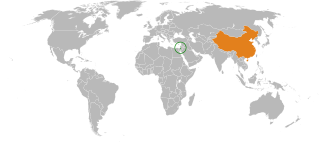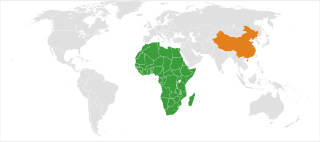
China, officially the People's Republic of China (PRC), has full diplomatic relations with 180 out of the other 192 United Nations member states, Cook Islands, Niue and the State of Palestine. As of 2024, China has had the most diplomatic missions of any state.
A special economic zone (SEZ) is an area in which the business and trade laws are different from the rest of the country. SEZs are located within a country's national borders, and their aims include increasing trade balance, employment, increased investment, job creation and effective administration. To encourage businesses to set up in the zone, financial policies are introduced. These policies typically encompass investing, taxation, trading, quotas, customs and labour regulations. Additionally, companies may be offered tax holidays, where upon establishing themselves in a zone, they are granted a period of lower taxation.
The Five Principles of Peaceful Coexistence are the Chinese government's foreign relations principles first mentioned in the 1954 Sino-Indian Agreement. Also known as Panchsheel, these principles were subsequently adopted in a number of resolutions and statements, including the preamble to the Constitution of the People's Republic of China.
China is one of the members of the United Nations and is one of five permanent members of its Security Council. One of the victorious Allies of World War II, the Republic of China (ROC) joined the UN as one of its founding member countries in 1945. The subsequent resumption of the Chinese Civil War between the government of Republic of China and the rebel forces of the Chinese Communist Party, led to the latter's victory on the mainland and the establishment of the People's Republic of China (PRC) in 1949. Nearly all of mainland China was soon under its control and the ROC government retreated to the island of Taiwan.

The African Union Commission (AUC) acts as the executive/administrative branch or secretariat of the African Union. It consists of a number of Commissioners dealing with different areas of policy. The African Union Headquarters are in Addis Ababa, Ethiopia. It should be distinguished from the African Commission on Human and Peoples' Rights,, which is a separate body that reports to the African Union.
Go Out policy or the Going Global Strategy is the People's Republic of China's current strategy to encourage its enterprises to invest overseas. The policy was announced as a national strategy by Jiang Zemin in March 2000.

The Conference on Interaction and Confidence-Building Measures in Asia (CICA) is an inter-governmental forum for enhancing cooperation towards promoting peace, security and stability in Asia. It is a forum based on the recognition that there is a close link between peace, security and stability in Asia and in the rest of the world. The key idea of the Conference is based on the priority of the indivisibility of security, joint initiative and mutually beneficial interaction of small and large states.

Zhai Jun is a Chinese diplomat, who has served as China's Special Envoy on the Middle Eastern Issue since 2019. As of 2022, he was the incumbent in the position. Previously, he served as Deputy Foreign Minister from 2009 to 2014, and was appointed Chinese ambassador to France in January 2014, replacing Kong Quan.
National champions are corporations which are technically private businesses but due to governmental policy are ceded a dominant position in a national economy. In this system, these large organizations are expected not only to seek profit but also to "advance the interests of the nation"; the government sets policies which favor these organizations. The policy is practiced by many governments, in some sectors more than others, but by giving an unfair advantage against market competition, the policy promotes economic nationalism domestically and global pre-eminence abroad contrary to the free market. The policy also deters or prevents venture capitalism.

The People's Republic of China (PRC) and the State of Israel formally established diplomatic relations in 1992. While the Republic of China had de jure recognized Israeli sovereignty in 1949, it eventually lost the Chinese Civil War, bringing the Chinese Communist Party (CCP) to power across mainland China. In 1950, Israel became the first country in the Middle East to recognize the PRC as the sole government of China, but the CCP did not reciprocate by establishing diplomatic ties due to Israel's alignment with the Western Bloc during the Cold War. This discontent persisted until the Cold War came to a close with the dissolution of the Soviet Union in 1991.
South-South Cooperation (SSC) is a term historically used by policymakers and academics to describe the exchange of resources, technology, and knowledge between developing countries, also known as countries of the Global South. The formation of SSC can be traced to the Asian–African Conference that took place in Bandung, Indonesia, in 1955 which is also known as the Bandung Conference.

China–Syria relations are foreign relations between China and Syria. The nationalist government of China recognized Syria in 1946. Diplomatic relations between both countries were established on August 1, 1956. China has an embassy in Damascus and Syria has an embassy in Beijing, the two governments generally maintaining a friendly political and economic relationship for the last several decades, which continues to endure despite the Syrian civil war.

Sino–African relations, also referred to as Africa–China relations or Afro–Chinese relations, are the historical, political, economic, military, social, and cultural connections between China and the African continent.

China–Palestine relations, also referred to as Sino–Palestinian relations, encompass the long bilateral relationship between China and Palestine dating back from the early years of the Cold War.
The China-Africa Development Fund, more commonly known as CAD Fund, is a China Government Guidance Fund solely funded by China Development Bank, a Chinese government policy bank. The aim of the fund is to stimulate investment in Africa by Chinese companies in power generation, transportation infrastructure, natural resources, manufacturing, and other sectors.
China's Special Envoy on the Middle East Issue is a special diplomatic position appointed by the Chinese Foreign Ministry. The Special Envoy focuses primarily on facilitating the Arab-Israeli peace process, although at various times, the Special Envoy has also addressed other major issues including the conflict in Syria.
Gong Xiaosheng is a Chinese ambassador.
The China–Arab States Cooperation Forum is a formal dialogue initiative between China and the Arab League established in 2004. It serves as the primary multilateral coordination mechanism between China and the Arab states.
Sun Bigan was a Chinese diplomat who served as the ambassador to several Middle Eastern countries and as China's Special Envoy on Middle East Issues.

China–Lebanon relations, also referred to as the Sino-Lebanese relations, refer to the bilateral relationship between China and Lebanon.









